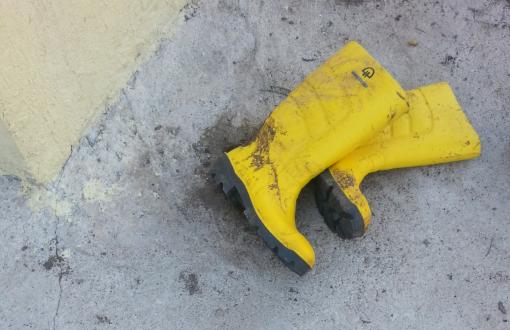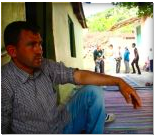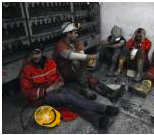“Up to now we would always have two or three funerals come up out the mine. We were used to it. This time when it surpassed 300, people caught wind.”
Soma residents are both trying to shake off the effects of the shock, and looking for a way to go on with their lives.
Some approach workplace murders going, “It’s fate, included in the nature of the business,” while some say, “We will bring the culprits to account; we will sue.”
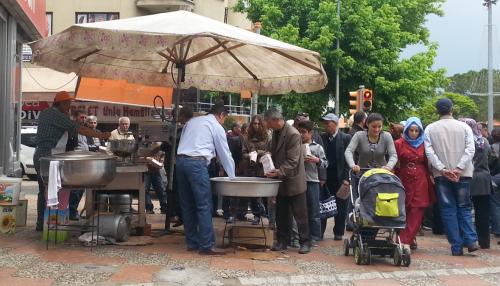
* Lokma, a syrupy doughy dessert, being doled out in the county center
The workplace murder where, according to official figures, 301 workers lost their lives is now on its sixth day. Other mining establishments of Soma Mining Inc. made a call to their workers. They will go back to work tomorrow. The workers are enraged at the situation, but they say, on the other hand, that they “have no other option.” Nearly all have bank loans to pay back, poverty is widespread, and there is no other means of sustenance.
Whomever you ask in the Soma mine region says, “Who would want to work below the ground, if we did not have to, we wouldn’t stay there for a minute.”
Especially in Kınık’s poor villages, every house has a miner. The only means of income is the mine.
Police officers everywhere you look
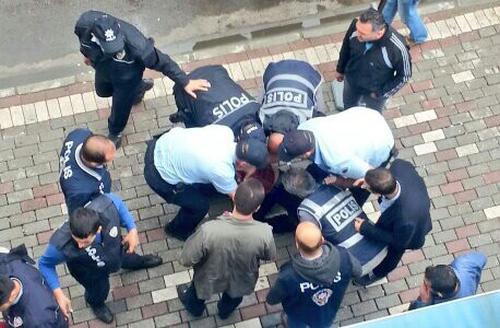
The silence and tense atmosphere follows you starting at the entrance of the county center. It is surely effective that in this tense atmosphere, there is an estimate of over 10 police officers per person. You see police officers and TOMAs wherever you look.
They do not give you a hard time if you tell them you are a journalist and show them your institution card, at least not in my experience.
But we heard first-hand that police “conducts close inspections” of the vehicles of political parties, non-governmental organizations and lawyers coming to the county or to villages to pay their condolences.
The mines are “closed”
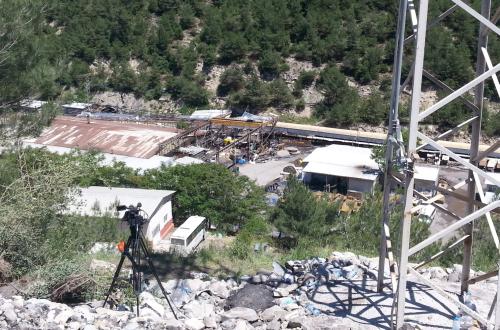
The Karanlıkdere Lignite mine where the workplace murder happened is completely closed. There are only live broadcast vehicles in front of it. It looks abandoned.
We asked to look at the other mines in the Ege Lignites Mine Area. We went to a few; the doors were sealed shut. We asked if we could talk to someone in charge and said we were going to ask about the claims concerning safety/inspection. No, they said, you cannot.
Locals distributed pastries to the police
People in the county center are cautious against people coming from outside. One sees this when the locals distribute pastries to police officials right after police forces beat and detain protestors and lawyers. But of course, there are some who are angry at the state...
“Nobody from the state showed up”
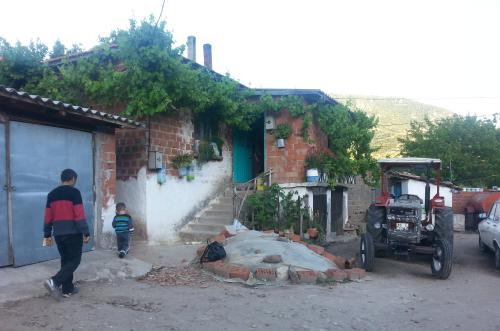
However, you receive a warmer welcome at the villages. The first thing we heard when we sat down at a coffeehouse in one of the Alevi villages was, “No-one from the state came to our funeral. Let alone a minister, or a county governor, not even a health official came.”
The villages are experiencing anger and grief at once. While the children greet us saying, “Hello, did you bring us any toys?” their mothers broach the subject going, “Our families are destroyed.”
They want to tell what happened, so that everyone will hear their voices.
Some of the houses do not have doors, some are still in construction, and the roofs of some are covered with tin. A 61-year-old peasant I spoke with in Elmadere says he lost his son, and asks who will take care of the family of 10 now.
He added, “Of course I will call the culprits to account on this, I will sue. Otherwise other such accidents will happen, and other people’s kids will die.”
“We haven’t seen any union leaders”
Whoever I interviewed in Soma district and nearby villages told me that the real death toll was not announced by the authorities.
While some survivor workers said “There is nobody trapped, everything happened in the cold storage”, others claimed that there were unsaved bodies in the mine. They were all saying different numbers.
One of the things they agree, on the other hand, is the fact that inspectors “had a quick look at the mines and preferred to eat dinners with the mine owners”. They also said they haven’t seen any union leaders at any time.
Those who lost their beloved ones in the mining disaster said that miners were telling for the past few weeks that the temperature was very high in the mine. They claimed that the miners complaint about the issue, which went ignored.
“They died before our eyes,” they said.
“The conditions were better back then”
I interviewed Durmuş Sidal in Kınık. If you remember the news, his daughter-in-law gave birth the day that his son Ergün Sidal died in the mine disaster.
“I will tell you all, if you will report them,” he said. You could see his frustration against the government and mine owners.
Leaving behind his third year at the mine, his son was married for 1.5 years. Durmuş Sidal himself also retired from the same mine, however his period was under Turkish Mining Corporation (TKİ).
“The working conditions were quite good then, I went back there when my son was trapped. It was terrible inside,” he continued.
“I lost my 29 year old son, I won’t leave the pursuit. I am going to file a lawsuit, I will also talk to the press. I will ask them to account for this. He died for 1500 liras, even before seeing his new-born child.”
“They shouldn’t remain thirsty”
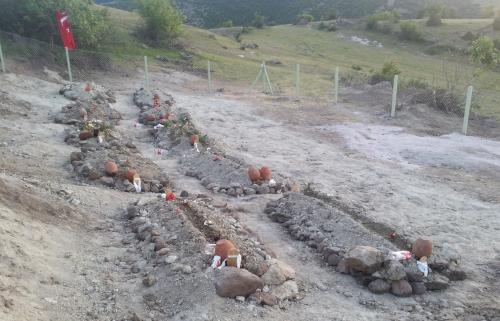
Elmadere villagers buried 12 minors to the ground. They have built a cemetery on a hill with the full of the village. I went to the cemetery where there were half a dozen children and a man whom they were calling their “grandfather”. He called the children and made them go for water at a fountain by the cemetery entrance covered with barbed wire. A jug stood by the side of each grave.
He explained the situation as I was looking: “They left [died] burning, they shouldn’t remain thirsty now.” (AS/PU/BM)
* Click here to read the article in Turkish.





